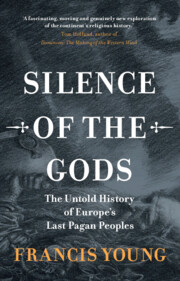Book contents
- Silence of the Gods
- Reviews
- Frontispiece
- Silence of the Gods
- Copyright page
- Dedication
- Contents
- Maps
- Plates
- Preface
- Abbreviations
- Introduction
- 1 Europe’s Unchristianised Edge
- 2 Mere Christianisation
- 3 (Counter-)Reformation in Unchristianised Europe
- 4 Antiquarians and Witch-Hunters
- 5 Darkness in Light
- 6 Folklore and Fantasy
- Epilogue
- Bibliography
- Index
Introduction
Published online by Cambridge University Press: 19 June 2025
- Silence of the Gods
- Reviews
- Frontispiece
- Silence of the Gods
- Copyright page
- Dedication
- Contents
- Maps
- Plates
- Preface
- Abbreviations
- Introduction
- 1 Europe’s Unchristianised Edge
- 2 Mere Christianisation
- 3 (Counter-)Reformation in Unchristianised Europe
- 4 Antiquarians and Witch-Hunters
- 5 Darkness in Light
- 6 Folklore and Fantasy
- Epilogue
- Bibliography
- Index
Summary
The introduction deals with the problematic concept of ‘paganism’ and the nature and variety of Europe’s pre-Christian religions, examining concepts such as animism, religious creolisation, ‘shamanism’, syncretism, and the ‘Christianesque’, as well as exploring the difference between conversion and Christianisation. The introduction argues for the use of the term ‘unchristianised peoples’ as the best one to describe its subject. It surveys the historiography of the last pre-Christian peoples and delineates and justifies the book’s chronological and geographical scope. The introduction critiques the concept of ‘pagan survivals’ in the traditional historiography of European religions, arguing for a tighter definition of pre-Christian religions, and outlines the nature and limitations of the sources available for studying pre-Christian cults.
Keywords
Information
- Type
- Chapter
- Information
- Silence of the GodsThe Untold History of Europe's Last Pagan Peoples, pp. 1 - 60Publisher: Cambridge University PressPrint publication year: 2025
